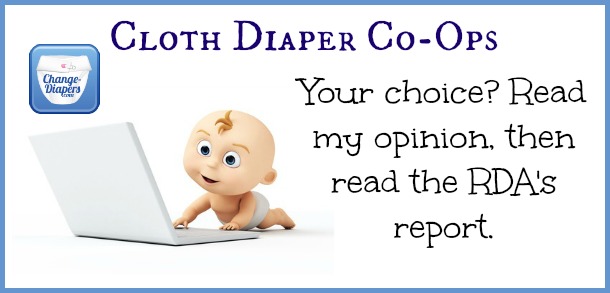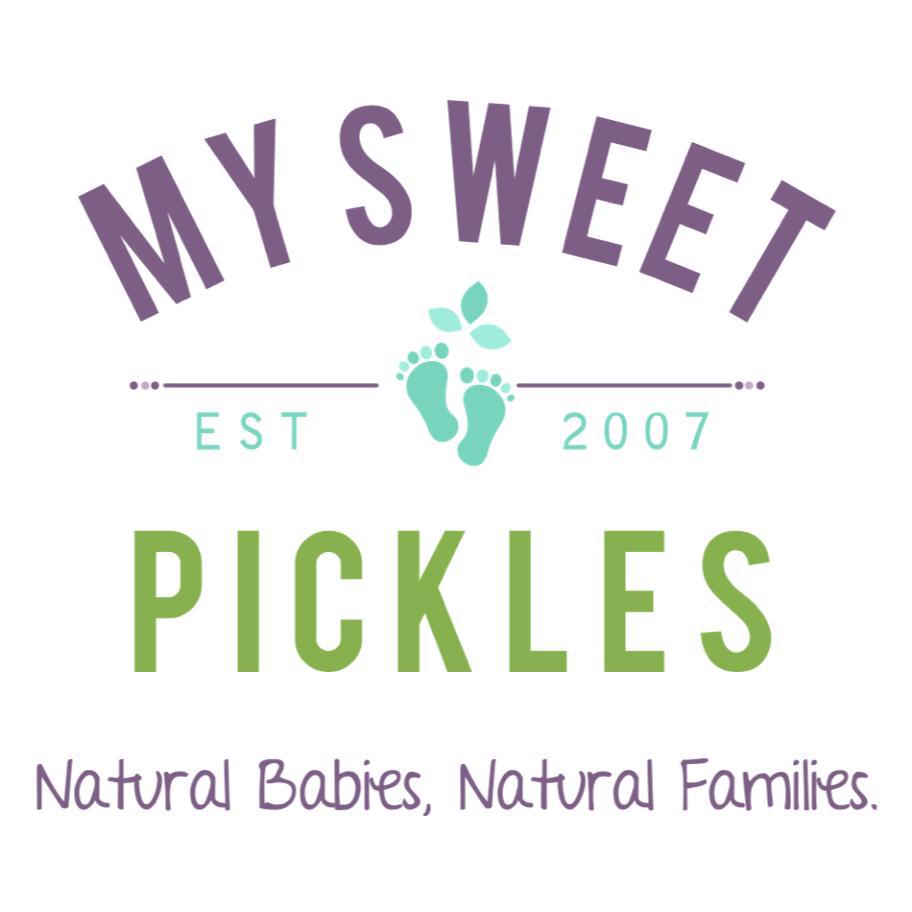Cloth diaper co-ops. Like cloth diaper detergents, this discussion can really divide the cloth diaper community. Throughout my journey, I’ve had the pleasure of working with cloth diaper manufacturers, retailers, and cloth diapering families. I’ve become friends with many, and stood beside an old friend of mine as she started her own store. I’ve also been in the position of wanting to cloth diaper, but having limited (that is, essentially none at all) funds to do so. The Real Diaper Association (RDA) is not an industry organization, but an organization to advocate for cloth diapering (I’m a member.) They released a report on how co-ops affect cloth diapering as a whole, not just how it affects one aspect or part of the industry. I want to share my thoughts, as well as some parts of the report that struck a chord for me.
I’ve heard it said that I am “anti co-op.” I’m not anti co-op. I’m anti illegal, unethical or unauthorized co-ops. I’m anti infringing, black market diapers, and I’m pro cloth diapering, and pro cloth diapering industry. If a manufacturer or WAHM has authorized the co-op, if the co-op organizers are acting ethically, paying taxes etc. Great! There ARE ethical co-ops out there. Unfortunately there are also a lot of not-so-great ones out there.
Many manufacturers require that retailers be established, have a brick & mortar store, and/or provide a photo of their store before approving their wholesale account. Part of this may be due to the high turnover of online diaper retailers, and the subsequent discounting of the products. Part of it is to avoid being duped into approving cloth diaper co-ops. While some manufacturers will work with co-ops or deal sites, others feel that this hurts relationships with their retailers. One big order is appealing, but not at the expense of retailers. This makes it even more difficult to get started as a new retailer.
The RDA’s report says: “We do not accept the inevitability of black market diaper co-ops. We reject the illegal, and we discourage the unethical. We embrace independent retail of cloth diapers. We embrace legal, ethical, sustainable cloth diapering.”
Some co-op organizers may not realize that they have legal requirements such as obtaining a business license, remitting federal tax and state sales tax, as well as complying with federal and local requirements (such as CPSIA compliance.) The co-op organizer could be held liable for product testing, labeling, and patent infringement.
Often illegal co-op items are low cost, low quality items with no warranty. This can lead to families getting a poor cloth diapering experience, as well as going to local retailers for help, with no intentions to buy.
“Co-ops Create Unsustainable Expectations Co-ops often operate illegally, creating expectations among consumers that legitimate business costs are optional.” This portion of the report really resonated with me. If a co-op is operating illegally, without the costs of licensing, taxes, overhead etc. it creates an unreasonable expectation for cloth diapers to be sold at these low prices. For a manufacturer producing diapers in the United States, Canada or overseas ethically, believe it or not neither they, nor their retailer is making big bucks. Even work-at-home-moms who sell exquisite diapers for $30+ are often making just enough to put back into more materials. They aren’t charging $20+ for cloth diapers to get rich. Business costs are not optional for legitimate businesses and margins in the cloth diaper industry are extremely slim.
When you buy a diaper that is available from retailers, through a co-op, you are hurting the retailer (who would buy an item at full price that they could get for a steal?) but in the long run, you’re hurting yourself. Many retailers will stop carrying a product that is sold through co-ops or deal sites, so you will soon be unable to find those products there.
The RDA’s report has a very interesting section (page 13) and graph on what happens if cloth diapers become a commodity. Don’t let cloth diapers become a commodity. This may make no sense out of context, so please do see this portion of the report.
The report says: “If you care about the social or environmental sustainability of cloth diapering, if you care about the survival of the cloth diaper industry, you need to buy and use diapers by your values. Otherwise, your choices are going to go away.”
One of my first posts on this blog was jokingly entitled “I’m too Poor to Have Convictions.” My choice to switch to cloth diapers, despite the cost of “safe” detergents was not because of my values, but because of my son’s skin sensitivity. There was no possible way for us financially, to buy a full stash of pocket diapers at once. In 2009, there wasn’t a cloth diaper blogger on every street corner (just kidding) and it wasn’t easy to find great resources for tips on cloth diapering with receiving blankets & flour sack towels. If I’d had someone to hold my hand, I probably would have gone that route rather than wash 3 diapers twice a day & buy one diaper at a time. There are options out there! Even if you pinch pennies by cloth diapering with receiving blankets for a few months, eliminating the cost of disposables will allow you to buy your “easy” stash more quickly, with quality diapers from reputable manufacturers and retailers. If you’re still expecting, buy a diaper a week, or set aside your disposable diaper budget every week during your pregnancy.
“If [co-ops] continue to undercut the quality and pricing for cloth diapers, local industry — both manufacturers that operate from the U.S. or Canada AND the retailers who sell and support those brands — will shut down. This in itself would severely limit consumer choices, and it’s not apparent that all cloth diaper co-op participants are aware of this. If YOU are concerned about the long-term health of the cloth diaper industry in the U.S. and Canada and its contributions to local jobs and communities, or if you are concerned about the long-term availability of quality cloth diapers, we recommend that you don’t participate in cloth diaper co-ops.” – From the RDA’s report.
I want quality cloth diapers to be readily available when my children have children. I want to see manufacturers and retailers thrive. Therefore, I do not support unauthorized or illegal co-ops.










 Maria wants to live in a world where cloth diapers are the norm and moms can make parenting choices without judgement. When she’s not chasing her 18, 14 and 11-year old kids around, you might find her checking out the latest gadgets, organizing something (again) or exercising in the fresh air.
Maria wants to live in a world where cloth diapers are the norm and moms can make parenting choices without judgement. When she’s not chasing her 18, 14 and 11-year old kids around, you might find her checking out the latest gadgets, organizing something (again) or exercising in the fresh air. 







The co-op pockets I have are super poor quality. Hate them. Leak every use.
[…] co-op report has opened my eyes to how illegal co-ops affect cloth diapering. My post about illegal cloth diaper co-ops is much more strongly worded than my average post, and some took it as judgement of those who use […]
[…] is infringing without asking the creator of the diaper possibly being infringed upon. In my post about cloth diaper co-ops, I briefly mentioned patent infringement as an issue, but this is not limited to co-op cloth […]
I admit I am guilty of buying diapers from co-ops. I got sucked in by the low prices and cute patterns like so many others. I can honestly say now that they are not worth it. After about 15 months of use, most of the ones I still have (I gave away and sold many because I didn’t like the fit) now leak or wick at the seams, or they just look old and worn. It seems no matter how many brands/kinds I try, I keep going back to the Cotton Babies brands and WAHM-made diapers because they have lasted the longest and still work well. When I discovered co-ops, and that you could get these super-cute pocket diapers for just $3-$4, I was so mad that I wasted all that money on BumGenius 4.0s and Flip covers with Indian prefolds, even the Econobum ones seemed over-priced in comparison, but those are the ones I keep going back to over and over because they last and they work! The diapers I bought from co-ops are the ones that were really the waste of money. I understand the allure of cheap diapers, but even if you are tight on money, buying a few good quality covers and using flour sack towels (just $1 each at Walmart!) as inserts while you slowly build up your stash is a perfectly reasonable and affordable solution.
Does anyone know how ethical Kawaii is? I did some research, and I felt comfortable buying Kawaii diapers, but sometimes I wonder if they’re too good to be true… If anyone has any info that is relevant, let me know!
I know that Kelly’s Closet carries the brand and they investigate brands before they pick them up. I haven’t done loads of research but I know others have and feel comfortable with them.
Very interesting article/post. Some of the quotes in article remind me of the movie The Lorax. I’ve got to agree if we don’t support what is supporting North America then we will lose out and we pay the price in the end! Then sure every diaper would be cheap and we’d need to repeat buying diapers 2-3 times. To me my time and money is worth every effort into researching diapers that last and work. I can spend hours searching for the right one. Versus running into problems every single wash. No one is perfect either.
Maria, your first point also resonated with me the most because the most common response I hear when it comes to co-ops is “they make it possible for us to afford cloth diapers, so quit criticizing!”
So, naturally, after you buy the cheap $3 or $5 diapers, what you see online and in brick-and-mortar stores is going to look “expensive,” when that’s not true at all. These businesses are burdened with regulations, fees and overhead costs AND their mark up is not big at all. They are offering good prices for good products, PLUS prompt and personal service. Isn’t that something American families should support?
And I always have to come back to flats and prefolds. If you are looking for cheap, look no further. One cover and 6 flats can cost $15 or less. You can’t get 6 pocket diapers from China for less than $15!
Let’s not forget the consumer side of this, too, where co-op diapers can take forever to get to your doorstep, co-op hosts can abscond with money, and the diapers often have little or no customer support attached. I would much rather buy my diapers from a place with great customer support and Better Business Bureau accountability! I think co-ops offered by small sole-proprietor-type businesses are just fine, though.
Maybe if you used a coop you could afford cloth diapers. The mark-up is ridiculous. Not all coops operate illegally and sell crap. If cloth diapers were more affordable more people would use them, which in the end is better for our planet. If coops make cloth diapering more affordable than all for them, sorry about the retailers pocket- but this one is for the environment!
“The retailer’s pockets” are mostly pockets of parents trying to support thier children and promote cloth diapering. I think that the point of this article is that the local retailers can not afford to do it for less, and if we continue supporting co-ops for “China cheapies”, we will find most of the smaller retailers going out of business, also causing a loss of local jobs. Similiar to supporting small local farmers when you can rather than buying from the supermarket where pretty nearly everything is grown in Mexico or China. When you buy diapers that are made in US or Canada you also know that the people making the diapers are recieving a fair wage, and that there will be accountability for quality work.
Your family’s finances are just as important as the environment, so I understand that you want to find affordable cloth diapers. But, in the long run, co op diapers coming from china or other countries (while better than disposables), are significantly LESS friendly than retail. Just because you want to cloth diaper does not mean you are entitled to fancy AIOs and cute pockets. Say you have $75 to start your stash. What’s more environmental: shipping a bunch of diapers from china (which you will likely need to replace after one kid) , or buying a small, USA made supply of prefolds and covers (which will last multiple kids)?